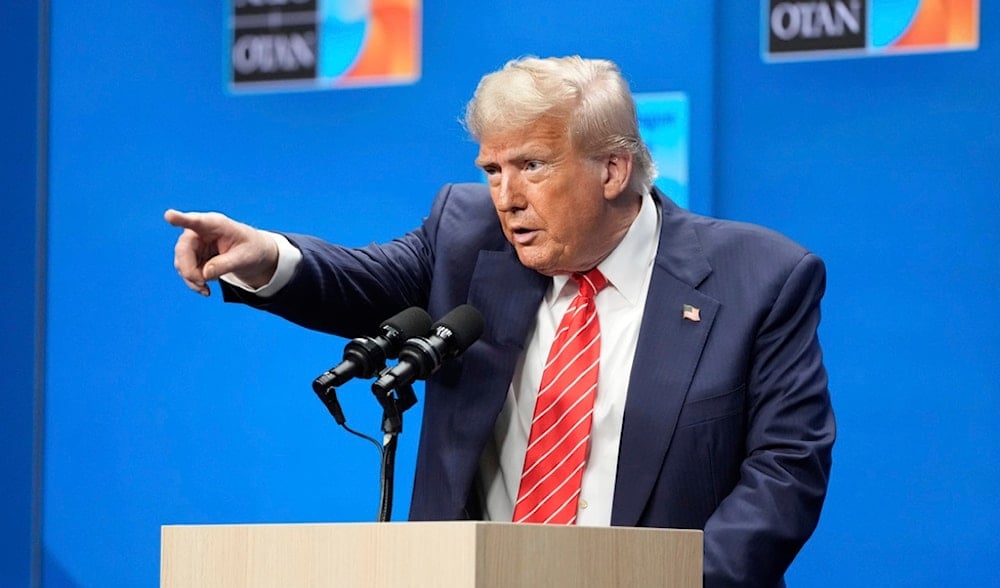'What is he hiding?': Democrats slam Trump for Iran intel restrictions
Top Democrats criticize US President Trump’s decision to restrict intelligence sharing on US airstrikes against Iran’s nuclear facilities, accusing the White House of hiding critical information and undermining congressional oversight.
-

US President Donald Trump gestures during a press conference after the plenary session at the NATO summit in The Hague, Netherlands, Wednesday, June 25, 2025. (AP)
Top US congressional Democrats are voicing sharp criticism over President Donald Trump’s decision to restrict classified intelligence sharing with Capitol Hill following media leaks regarding a preliminary assessment of US airstrikes on Iran’s nuclear facilities.
The move has ignited a political firestorm in Washington, with lawmakers accusing the administration of avoiding transparency and accountability.
Senate Minority Leader Chuck Schumer (D-New York) led the charge, telling Axios, "This isn't about national security, it's about Trump's insecurity. President Trump is cutting off intelligence to Congress, raising one clear question: what is he hiding?"
Senate Minority Whip Dick Durbin (D-Illinois) added that the administration was "embarrassed by the leak" because it suggested that Iran’s nuclear program had not been obliterated as promised.
Senator Mark Warner (D-Virginia), the top Democrat on the Senate Intelligence Committee, described the situation as "extraordinarily disturbing."
Similarly, House Intelligence Committee ranking member Jim Himes (D-Connecticut) criticized the administration for using speculation to justify restricting Congress and emphasized that the law mandates the intelligence community to keep Congress "fully and currently informed."
Representative Andre Carson (D-Indiana) expressed concern over "punitive or partisan restrictions" on congressional oversight. Democratic aides and officials described the decision to delay scheduled briefings and the absence of Director of National Intelligence Tulsi Gabbard from a Senate Intelligence Committee session as signs of the administration’s unwillingness to provide transparency.
White House declares war on leakers
The backlash stems from reports that an initial US intelligence assessment, leaked to CNN and other outlets, reported that the US airstrikes only set back Tehran’s nuclear program by months, contrary to Trump’s claim that they obliterated the facilities. In response, CIA Director John Ratcliffe issued a statement describing the impact as having "severely damaged" Iran’s nuclear capabilities, signaling a refined administration narrative.
"We are declaring a war on leakers," a senior White House official said, citing frustration that sensitive information was published shortly after being shared with Congress.
In a bid to contain the fallout, the White House plans to send four top officials to brief the Senate: Defense Secretary Pete Hegseth, Secretary of State Marco Rubio, CIA Director John Ratcliffe, and General Dan Caine, chairman of the Joint Chiefs of Staff. Tulsi Gabbard will not be attending, raising further questions among Democrats. "Ratcliffe will represent the intelligence community," an official noted.
General Caine and other military leaders have issued cautious statements, noting "extremely severe damage and destruction" but stopping short of confirming total elimination of the facilities. Trump has publicly sidelined Gabbard for her prior testimony that Iran was not actively building a nuclear weapon.
The administration's campaign to control the narrative includes a Thursday Pentagon news conference where Hegseth and military representatives will defend the mission. Trump has claimed that pilots flew "36 hours through Enemy Territory," a statement later clarified by officials.
The originally scheduled classified briefings for Congress were postponed, reportedly to allow ceasefire negotiations and accommodate travel plans. As the Senate prepares for the rescheduled briefing, Democrats continue to press the administration for transparency and full disclosure about the Iran strike and the rationale behind limiting intelligence access.
Read more: Iran filled in nuclear site tunnels ahead of US airstrikes: Analysts

 3 Min Read
3 Min Read










